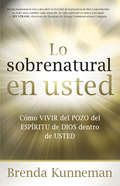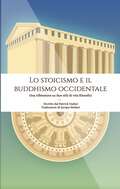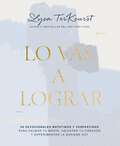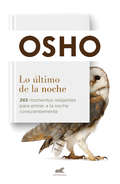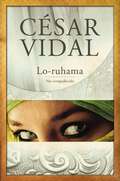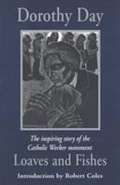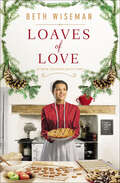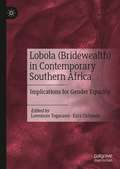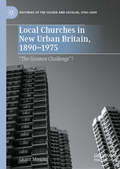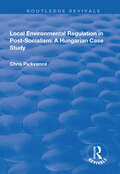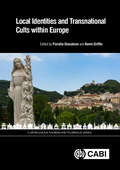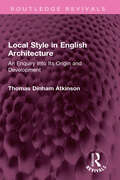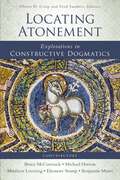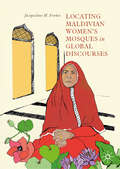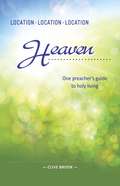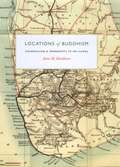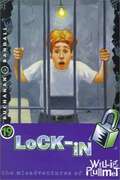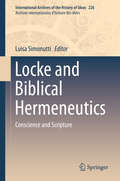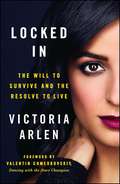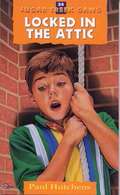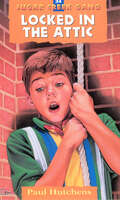- Table View
- List View
Lo sobrenatural en usted: Cómo vivir del pozo del Espíritu de Dios dentro de usted
by Brenda KunnemanCon frecuencia, nos encontramos buscando a Dios para que obre a favor nuestro en medio de la crisis y los problemas. No entendemos por qué no recibimos las respuestas que necesitamos. En momentos de desespero, buscamos remediar, sin percatarnos que Dios ya ha colocado dentro de cada uno de nosotros un recurso que atenderá nuestras circunstancias más desafiantes. Es un río que mana de nuestro espíritu.En lo sobrenatural en usted, Brenda Kunneman le muestra cómo aprovechar ese río y:Desatar la unción que hay dentro de ustedAprender a orar el tipo de oraciones que producen milagrosExperimentar el poder sobrenabural de DiosResistir los intentos del enemigo por abatirloSatanás le teme cuando usted vive de su río espiritual. El enemigo le teme a su valentía, a lo que usted lleva dentro, y sabe que nada puede detener el agua de ese embravecido río. Permita que ese poder imparable obre en su vida. Eso remediará cada necesidad y eliminará los obstáculos de su camino porque usted verá ¡lo sobrenatural en usted!.
Lo stoicismo e il buddhismo occidentale: Una riflessione su due filosofie di vita
by Patrick UssherMolti praticanti del buddhismo trovano che la filosofia stoica, antica filosofia e stile di vita greco-romano, sia un utile contributo alla propria vita, affine a quello della propria via. Dall’altro lato, anche molti stoici moderni praticano la meditazione di ispirazione buddhista, e trovano sostegno nelle idee e pratiche da esso ispirate. In questa estesa riflessione, Patrick Ussher considera in che modo il buddhismo e lo stoicismo siano affini – entrambi filosofie altamente impegnate e pratiche, da intendersi come stili di vita, che possono anche informarsi e illuminarsi reciprocamente. Il libro esplora i temi della consapevolezza buddista e stoica, le intuizioni psicologiche condivise e le pratiche stoiche e buddiste per coltivare la compassione e l’amore per il prossimo. Patrick Ussher affronta anche il motivo per cui, fra tutte le forme di buddhismo, quella più simile allo stoicismo è il “buddhismo occidentale”. In Occidente, il buddhismo è stato “riaggiornato” in una forma di filosofia pratica, intesa come stile di vita, altamente impegnata e concentrata sul momento presente. Guarda caso, questa “reinvenzione” occidentale del buddhismo si rivela essere molto più vicina alla filosofia stoica di quanto non sia prossima al buddhismo tradizionale da cui attinge. Allo stesso modo, anche lo stoicismo in tempi recenti è andato incontro a una “reinvenzione”, che ha particolarmente enfatizzato la sua natura pratica di filosofia intesa come stile di vita; ciò è accaduto anche per rivolgersi a tutti, a prescindere dalla fede in Dio, che era una caratteristica essenziale dello stoicismo tradizionale. Lo “Stoicismo moderno” che ne deriva è allo stesso modo più vicino al buddhismo occidentale di quanto non lo sia allo stoicismo tradizionale. Questo libro è scritto per chiunque sia interessato a come lo stoicismo o il buddhismo possano essere un contributo benefico e autentico alla propria vita, ma anche a chiunque sia anc
Lo tuyo, lo mío y lo nuestro: Para que el dinero no sea un problema en casa
by Javier E. Angulo CardinaleUno de los principales conflictos de las parejas casadas es no saber cómo distribuir sus ingresos y administrar sus finanzas. Esta disfunción es suficiente para llevar a familias enteras a la división. El autor Javier Angulo formula en su libro modelos prácticos destinados a aclarar expectativas, ideas falsas y engaños, con el fin de llegar a acuerdos saludables que les permitan a sus lectores alcanzar sus metas y sueños en medio de la armonía familiar.
Lo vas a lograr: 50 devocionales matutinos y vespertinos para calmar tu mente, aquietar tu corazón y experimentar la sanidad hoy
by Lysa TerKeurstIncorpora un nuevo ritmo para los días en que la vida te parece demasiado dura mediante la práctica diaria de recibir y soltar: recibir el aliento, la instrucción y la verdad de Dios para empezar el día y soltar a Dios todo lo que te agobia al final de cada jornada. Él te pondrá en el camino de la curación.En su nuevo devocional, la autora best seller del New York Times, Lysa TerKeurst, te ayuda a permanecer conectada con Dios y a seguir amando a los demás incluso en medio de circunstancias desalentadoras, decepcionantes o incluso devastadoras. Experimenta 50 días de devocionales matutinos y vespertinos complementados con hermosas fotografías en color de lugares significativos en los que Lysa ha trabajado a través de su propia sanación. Cada devoción contieneun versículo bíblico para empezar el díauna declaración de verdad para recordar a lo largo del díaun espacio para escribir y devolver algo a Dios al final del díauna oración que debes recibir antes de irte a dormir para prepararte mejor para mañanaSin estos componentes cruciales entretejidos en la rutina de nuestras temporadas más duras, conectar con el Señor puede empezar muy pronto a sentirse abrumador y como un elemento más de nuestras listas de tareas pendientes. Lysa comprende esta lucha y quiere crear un espacio sagrado donde las mujeres puedan cerrar sus días con Dios simplemente apareciendo, empapándose de la verdad y recordando que no están solas en su viaje de sanación.A su manera amable y sin pretensiones, Lysa te guía a través de las páginas de Lo vas a lograr, donde podrásrecibirás la verdad bíblica y el ánimo que necesitas cuando las situaciones hirientes te dejan agotada y sin motivación para pasar tiempo con Dios.escaparás de la soledad de intentar sanar por tu cuenta con la sabiduría de confianza de una maestra de la Biblia y amiga que comprende tu dolor y quiere ayudarte a seguir adelante.tener la seguridad de que, aunque esta temporada difícil forme parte de tu historia, no será toda tu historia.Esta temporada difícil no tiene por qué ser una época de adormecer el dolor o de seguir por las ramas. Deja que este devocional te ayude a ser intencional y a saber que, aunque sea una época difícil, también puede ser una época santa.You're Going to Make ItIncorporate a new rhythm for those days when life feels too hard through the daily practice of receiving and releasing—receiving God's encouragement, instruction, and truth to start your day and releasing to God all that's weighing you down at the end of each day. He'll set you on a path toward healing.In her newest devotional, New York Times bestselling author Lysa TerKeurst helps you stay connected to God and continue loving others even in the middle of discouraging, disappointing, or even devastating circumstances. Experience 50 days of morning and evening devotions complimented with beautiful color photography of significant locations where Lysa has worked through her own healing. Each devotion contains:a Bible verse to start your daya statement of truth to remember throughout your dayspace to write and release something back to God at the end of your daya prayer to receive before you go to sleep to better prepare for tomorrow
Lo último de la noche: 365 momentos relajantes para entrar a la noche conscientemente
by OshoPensamientos breves, polémicos y transgresores. Los 365 pensamientos compilados fueron seleccionados de las pláticas íntimas que, a lo largo de su vida, Osho mantuvo frente a personas de diversas condiciones sociales. Reunirlos en este libro y en su complemento, Lo primero de la mañana, fue idea del propio Osho. Los lectores hallarán pensamientos breves, polémicos y transgresores . Los temas que el místico contemporáneo aborda son diversos: el sufrimiento humano, el amor, lo religioso, la existencia, Dios, la mente, meditación occidental, la espontaneidad, el ego, la luz interior, la dicha, la verdad, entre otros. «Estos libros se han planeado de tal forma que cada día tienen un tema particular, y los pasajes de la mañana y de la noche se complementan. Así que Lo último de la noche puede leerse solo o en conjunto con el libro matutino»
Lo-ruhama: No compadecida
by Cesar VidalDel aclamado y condecorado autor CésarVidal surge la pregunta: "¿Hasta dónde está dispuesto a perdonar?"Es la historia de Oseas y su relación con Gomer. En una sociedad en la que el dinero, la prosperidad y el sexo han terminado por empañar el mensaje espiritual y el cumplimiento del pacto, Oseas, un hombre traicionado por su mujer, descubre no sólo que existe una solución para su drama matrimonial sino que además a través de él, Dios anuncia salvación al pueblo de Israel.
Loaves And Fishes
by Dorothy DayStory of the author's thirty years as a leader of the Catholic Worker movement, and the St. Joseph's House of Hospitality in New York City.
Loaves of Love: An Amish Christmas Bakery Story (Amish Christmas Bakery Stories)
by Beth WisemanAs the only girl in a family of eight, Katie Swartzentruber has been left in charge of her family&’s bakery while her mother recuperates from surgery. At first, Katie doesn&’t think tending to the bakery alone will be difficult. She&’s worked alongside her mother for years. But Christmas is coming, and with the holiday comes a flood of patrons, both regulars and tourists. When Katie becomes overwhelmed with the orders she is receiving, she is tempted to move her Old Order family into the modern world by purchasing propane ovens to help with the workload. She finds help from an unexpected source—childhood friend Henry Hershberger, who has harbored a secret crush on Katie for years. He&’s been afraid to tell her how he feels, but he&’s sure that this Christmas is his moment. As the demands of the bakery only get more intense, both Katie and Henry have to decide what really matters . . . and find the courage within themselves to go after it.
Lobola (Bridewealth) in Contemporary Southern Africa: Implications for Gender Equality
by Lovemore Togarasei Ezra ChitandoThis volume explores the multiple meanings and implications of lobola in Southern Africa. The payment of lobola (often controversially translated as ‘bridewealth’) is an entrenched practice in most societies in Southern Africa. Although having a long tradition, of late there have been voices questioning its relevance in contemporary times while others vehemently defend the practice. This book brings together a range of scholars from different academic disciplines, national contexts, institutions, genders, and ethnic backgrounds to debate the relevance of lobola in contemporary southern African communities for gender equality.
Local Churches in New Urban Britain, 1890-1975: “The Greatest Challenge”? (Histories of the Sacred and Secular, 1700–2000)
by Grant Masom“This monograph is an important contribution to our understanding of the varied fortunes of British Christianity during the twentieth century.” - Rev Dr Andrew Atherstone, Tutor in Church History and Latimer Research Fellow, Wycliffe Hall, University of Oxford, UK “This book is an important and original work. Anyone interested in twentieth-century Christianity in Britain will learn much from it. Grant Masom enables the reader to make sense of the new urban spaces that became a key part of British life in the last hundred years.” - Rev Dr David Goodhew, Visiting Fellow of St Johns College, Durham University, UK “This ground-breaking study adds new depth to our understanding of the importance of religion in English life and the role of the churches in shaping their own destiny in the first three-quarters of the twentieth century.” - Dr Mark Smith, Associate Professor in History, University of Oxford, UK This book contributes to the ongoing academic debates on secularisation—or the marginalisation of mainstream religious beliefs and practices—in twentieth-century British society. It addresses three areas in which the current literature is weak: the ‘agency’ of organised religion in the outcomes described as secularisation, rather than explanations based on external challenges (such as the ‘modernisation’ of society and thought, increased affluence, and more leisure choices); a focus on urban areas transformed by twentieth-century industrialisation and suburbanisation; and an extended time period to the end of the third quarter of the twentieth century, allowing proper consideration of long-term trends alongside short-term upheavals such as the World Wars, the Great Depression, and the social changes of the 1960s. Further, the book employs a distinctly different, highly data-driven approach, considers all religious movements, and sets its conclusions within the wider social and cultural context of a representative community.
Local Environmental Regulation in Post-Socialism: A Hungarian Case Study (Routledge Revivals)
by Chris G. PickvanceThis title was first published in 2003. This text examines Hungarian local environmental regulation in practice rather than what should happen according to national legislation. The book is based on interviews with officials, regulators, firm managers and environmental groups in four localities in Hungary and on a national survey of local government officials. Numerous quotations from interviews are included. It is shown that the local social and economic context influences the behaviour of both local governments and regional environmental inspectorates. Firms' responsiveness to regulation is studied and it is shown that while some firms are ready to pay moderate environmental fines others are afraid of even symbolic fines. The findings are set within debates in the international literature on environmental regulation. It is shown that there are convergences with patterns reported in developed capitalist societies, but that certain legacies from state socialism are compatible with these patterns.
Local Identities and Transnational Cults within Europe (CABI Religious Tourism and Pilgrimage Series)
by Kevin Griffin Professor Fiorella Giacalone Alfonsina Bellio Riccardo Cruzzolin Paola De Salvo Laurent S. Fournier Etienne Guillaume André Julliard Tony Kiely Inga B. Kuzma Mathilde Lamothe Gaëlla Loiseau Daniele Parbuono Gianfranco SpitilliLocal-level pilgrimages, when based on strong expressions of faith, can have a much wider local, regional and international appeal. It has been estimated that pilgrims and religious tourists number around 330 million per year, meaning development of these faith identities can help drive destination visitation and regional development. This book explores the central role of ordinary people in the popularisation of faith-based practices, thus illustrating religious tourism as an expression of cultural identity. Focusing on the interrelationship of cultural groups and the overall formation of culture and society, this book: - Uses a range of multidisciplinary, sociological and ethnographic studies to illustrate the evolution of pilgrimage sites and saints. - Includes practical case studies and illustrations of religious tourism and pilgrimage development from a variety of international perspectives. - Provides a selection of discussion questions for each chapter, encouraging readers to engage with further study and investigation of these important issues. An invaluable review of cultural identity and faith, this book delivers to scholars, students and local policy makers a collection of current perspectives on the growth, development and evolution of faith practices surrounding contemporary and historical sites and saints.
Local Identities and Transnational Cults within Europe (CABI Religious Tourism and Pilgrimage Series)
by Kevin Griffin Professor Fiorella Giacalone Alfonsina Bellio Riccardo Cruzzolin Paola De Salvo Laurent S. Fournier Etienne Guillaume André Julliard Tony Kiely Inga B. Kuzma Mathilde Lamothe Gaëlla Loiseau Daniele Parbuono Gianfranco SpitilliLocal-level pilgrimages, when based on strong expressions of faith, can have a much wider local, regional and international appeal. It has been estimated that pilgrims and religious tourists number around 330 million per year, meaning development of these faith identities can help drive destination visitation and regional development. This book explores the central role of ordinary people in the popularisation of faith-based practices, thus illustrating religious tourism as an expression of cultural identity. Focusing on the interrelationship of cultural groups and the overall formation of culture and society, this book: - Uses a range of multidisciplinary, sociological and ethnographic studies to illustrate the evolution of pilgrimage sites and saints. - Includes practical case studies and illustrations of religious tourism and pilgrimage development from a variety of international perspectives. - Provides a selection of discussion questions for each chapter, encouraging readers to engage with further study and investigation of these important issues. An invaluable review of cultural identity and faith, this book delivers to scholars, students and local policy makers a collection of current perspectives on the growth, development and evolution of faith practices surrounding contemporary and historical sites and saints.
Local Style in English Architecture: An Enquiry Into Its Origin and Development (Routledge Revivals)
by Thomas AtkinsonOriginally published in 1947, this book examines the regional styles of architecture which developed inside England itself, particularly during the later medieval period. It discusses the causes and locations of these regional variations. In explaining the cause for the geographical variations in stye, the author investigates the various factors responsible for bringing them about, such as geology, race, religion, foreign influence, transport and fashion. As churches have survived the passage of time better than many secular buildings, the emphasis is on church architecture (although not exclusively). The book contains over 120 photographs and the book is an original and important inquiry into the origin and development of local styles in English architecture.
Locating Atonement: Explorations in Constructive Dogmatics (Los Angeles Theology Conference Series)
by Oliver D. Crisp Fred SandersThe proceedings of the third annual Los Angeles Theology Conference seek to identify the place of the doctrine of atonement in systematic theology. Locating Atonement: Explorations in Constructive Dogmatics intentionally excludes discussion of theories of atonement, typologies of those theories, and contests among various theories. Instead, it undertakes the question: What else is there to do in atonement theology besides rehashing types and theories?
Locating Maldivian Women’s Mosques in Global Discourses
by Jacqueline H. FewkesIn this ethnographic examination of women’s mosques in the Maldives, anthropologist Jacqueline H. Fewkes probes how the existence of these separate buildings—where women lead prayers for other women—intersect with larger questions about gender, space, and global Muslim communities. Bringing together ethnographic insight with historical accounts, this volume develops an understanding of the particular religious and cultural trends in the Maldives that have given rise to these unique socio-religious institutions. As Fewkes considers women’s spaces in the Maldives as a practice apart from contemporary global Islamic customs, she interrogates the intersections between local, national, and transnational communities in the development of Islamic spaces, linking together the role of nations in the formation of Muslim social spaces with transnational conceptualizations of Islamic gendered spaces. Using the Maldivian women’s mosque as a starting point, this book addresses the roles of both the nation and the global Muslim ummah in locating gendered spaces within discourses about gender and Islam.
Location, Location, Location: One preacher's vision of holy living
by Clive BrookHow do we keep the same perspective as our Father in heaven in the midst of everyday life and its challenges? He asks us to be holy as he is holy, but what does holy living look like for regular folk? Clive Brook has a heart for the ordinary Australian and a vision for extraordinary Christian living. Known as a gifted preacher and a man of prayer and deep pastoral warmth, Clive Brook's sermons have inspired many during his years of ministry in the urban and outback parishes of Queensland. Now collated in this captivating book, Location, Location, Location: Heaven, these homilies can speak to a wider audience. Whether we are wondering about faith and forgiveness or struggling with drought, doubt and debt, Clive Brook's engaging words and knack for storytelling lift our eyes heavenward.Location, Location, Location: Heaven provides a vision for holy living that speaks to the hearts of Australian Christians.
Locations of Buddhism: Colonialism and Modernity in Sri Lanka
by Anne M. BlackburnModernizing and colonizing forces brought nineteenth-century Sri Lankan Buddhists both challenges and opportunities. How did Buddhists deal with social and economic change; new forms of political, religious, and educational discourse; and Christianity? And how did Sri Lankan Buddhists, collaborating with other Asian Buddhists, respond to colonial rule? To answer these questions, Anne M. Blackburn focuses on the life of leading monk and educator Hikkaduve Sumangala (1827-1911) to examine more broadly Buddhist life under foreign rule. InLocations of Buddhism, Blackburn reveals that during Sri Lanka's crucial decades of deepening colonial control and modernization, there was a surprising stability in the central religious activities of Hikkaduve and the Buddhists among whom he worked. At the same time, they developed new institutions and forms of association, drawing on pre-colonial intellectual heritage as well as colonial-period technologies and discourse. Advocating a new way of studying the impact of colonialism on colonized societies, Blackburn is particularly attuned here to human experience, paying attention to the habits of thought and modes of affiliation that characterized individuals and smaller scale groups. Locations of Buddhismis a wholly original contribution to the study of Sri Lanka and the history of Buddhism more generally.
Locations of Buddhism: Colonialism and Modernity in Sri Lanka (Buddhism And Modernity Ser.)
by Anne M. BlackburnModernizing and colonizing forces brought nineteenth-century Sri Lankan Buddhists both challenges and opportunities. How did Buddhists deal with social and economic change; new forms of political, religious, and educational discourse; and Christianity? And how did Sri Lankan Buddhists, collaborating with other Asian Buddhists, respond to colonial rule? To answer these questions, Anne M. Blackburn focuses on the life of leading monk and educator Hikkaduve Sumangala (1827–1911) to examine more broadly Buddhist life under foreign rule.In Locations of Buddhism, Blackburn reveals that during Sri Lanka’s crucial decades of deepening colonial control and modernization, there was a surprising stability in the central religious activities of Hikkaduve and the Buddhists among whom he worked. At the same time, they developed new institutions and forms of association, drawing on pre-colonial intellectual heritage as well as colonial-period technologies and discourse. Advocating a new way of studying the impact of colonialism on colonized societies, Blackburn is particularly attuned here to human experience, paying attention to the habits of thought and modes of affiliation that characterized individuals and smaller scale groups. Locations of Buddhism is a wholly original contribution to the study of Sri Lanka and the history of Buddhism more generally.
Lock-In: Willie Plummett (The Misadventures of Willie Plummett #19)
by Paul Buchanan Rod RandallIn honor of the eighth-graders' graduation, Willie's church is holding a Lock-In, including an exciting contest that might also introduce some of the participants to Jesus. Willie, Felix, and Sam find themselves on the same team during a lock-in scavenger hunt at church. Crusher, the neighborhood bully, is on the team too. Can smart thinking and Willie's wacky ideas help them win without getting tagged out by the "secret police" or pulverized by Crusher? The team discovers that winning isn't everything; they learn to share their faith and help each other through inventive creations and important conversations. There are more funny stories about Willie and his friends and their often ridiculous solutions to the problems of life in middle school and those sometimes awkward years between 11 and 14.
Locke and Biblical Hermeneutics: Conscience and Scripture (International Archives of the History of Ideas Archives internationales d'histoire des idées #226)
by Luisa SimonuttiThe volume presents illuminating research carried out by international scholars of Locke and the early modern period. The essays address the theoretical and historical contexts of Locke’s analytical methodology and come together in a multidisciplinary approach that sets biblical hermeneutics in relation to his philosophical, historical, and political thought, and to the philological and doctrinal culture of his time. The contextualization of Locke’s biblical hermeneutics within the contemporary reading of the Bible contributes to the analysis of the figure of Christ and the role of Paul’s theology in political and religious thought from the seventeenth century to the Enlightenment. The volume sheds light on how Locke was appreciated by his contemporaries as a biblical interpreter and exegete. It also offers a reconsideration that overarches interpretations confined within specific disciplinary ambits to address Locke’s thought in a global historic context.
Locked In: The Will to Survive and the Resolve to Live
by Valentin Chmerkovskiy Victoria ArlenESPN personality and Paralympics champion Victoria Arlen shares her courageous and miraculous story of recovery after falling into a mysterious vegetative state at age eleven and how she broke free, overcoming the odds and never giving up hope, eventually living a full and inspiring life.When Victoria Arlen was eleven years old, she contracted two rare diseases simultaneously and fell into a mysterious vegetative state. For two years her mind was dark, but in the third year, her mind broke free, and she was able to think clearly and to hear and feel everything—but no one knew. When she was fifteen years old, against all odds and medical predictions, she was finally able to communicate through eye blinks, and she gradually regained her ability to speak and eat and move her upper body, but she faced the devastating reality of paralysis from the waist down because of damage to her spine. However, Victoria didn’t lose her strength or steadfast determination, and two years later, she won a gold medal for swimming at the London 2012 Paralympics. In Locked In, Victoria shares her never-before-published story—the pain, the struggle, the fight to live and thrive, and most importantly, the faith that carried her through. Her journey was not easy, but by believing in God’s healing power and forgiveness, she is living proof that, despite seemingly insurmountable odds and challenges, the will to survive and resolve to live can be a force stronger than our worst deterrents. Not many people get a second chance at life like Victoria has, and she made a promise to God that she would make every moment count.
Locked in the Attic (Sugar Creek Gang #34)
by Paul HutchensThe simple decision to find a proper burial place for Alexander the Coppersmith lands the Sugar Creek Gang in the middle of another incredible adventure. A sudden rainstorm sends the Gang into the mysterious house on the hill. Once inside, the boys discover a dangerous criminal on the run from the law. The only way of escape is down the chimney. Come along and learn with the Sugar Creek Gang that God will always provide a way of escape for His children. The Sugar Creek Gang series chronicles the faith-building adventures of a group of fun-loving, courageous Christian boys. These classic stories have been inspiring children to grow in their faith for more than five decades. More than three million copies later, children continue to grow up relating to members of the gang as they struggle with the application of their Christian faith to the adventure of life. Now that these stories have been updated for a new generation, you and your child can join in the Sugar Creek excitement. Paul Hutchens's memories of childhood adventures around the fishing hole, the swimming hole the island, and the woods that surround Indiana': Sugar Creek inspired these beloved tales.
Locked in the Attic (Sugar Creek Gang Original Series #34)
by Paul HutchensIn a battle with a wildcat, Bill Collins's cousin's dog, Alexander, saved the gang, but lost his own life. Now Alexander's grave is in danger of being washed away by a flash flood. In relocating Alexander's grave to Tom the Trapper's dog cemetery, the gang discovers the hideout of an escaped criminal. They're trapped! Will evil triumph over good, or will the gang be taken hostage by this dangerous man? See how God protects those who trust in Him in Locked in the Attic.
Locked in the Attic (Sugar Creek Gang Original Series #34)
by Paul HutchensIn a battle with a wildcat, Bill Collins's cousin's dog, Alexander, saved the gang, but lost his own life. Now Alexander's grave is in danger of being washed away by a flash flood. In relocating Alexander's grave to Tom the Trapper's dog cemetery, the gang discovers the hideout of an escaped criminal. They're trapped! Will evil triumph over good, or will the gang be taken hostage by this dangerous man? See how God protects those who trust in Him in Locked in the Attic.
